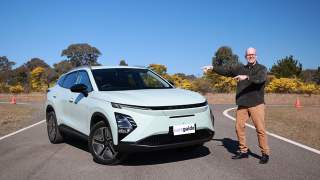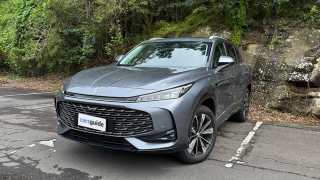
Do electric cars actually save you money?

When debating the pros and cons of electric cars vs petrol cars, cost and how much money you can save is the thing most often discussed.
Due to electric vehicles (EVs) being a relatively new technology, there are understandably a lot of questions from consumers in relation to them: Do electric cars save money? What’s the cost of running an electric car vs petrol (or the cost of charging electric car vs gasoline, for the US readers out there)? What’s an electric car cost per km or hybrid cost per km in comparison with petrol cars? And how many watts does an electric car use per km?
There’s a whole lot to consider when weighing up the cost of running an electric car vs gas/petrol car for those who don’t know their electric car kWh per km from their Kia Niro EV, so it’s best to break each topic down to see which option will save you the most money in the long run.
Electric cars vs petrol cars: upfront costs
Before diving in, it’s worth having a quick brush-up on the different types of EVs on the market.
EVs, also known as BEVs, have a battery that is charged either via the power grid or home energy capture like solar, whereas plug in hybrid electric vehicles (PHEVs) have a rechargeable battery as well as a traditional internal-combustion engine that kicks in if the battery runs out of power. A hybrid also has a battery and a combustion engine that work in tandem, but it doesn’t need to be plugged in - instead the electricity is generated via the motor and regenerative braking.
Currently the cheapest EV in Australia is MG Motor’s ZS SUV, which goes for $44,990 drive away - about $8000 less than the next cheapest option.


Download the EVGuide Report, 2022
Australia's one-stop snapshot of all things relating to electric cars.
MG Motor also come up tops with the ultimate cheap petrol-powered car, its 1.5-litre four-cylinder petrol MG 3 Core, which comes in at $18,990 drive away.
The price disparity in cost is a simple case of economies of scale.
The lower demand for EVs means lower volumes of vehicle parts are being produced, resulting in a higher cost. Add in the fact that companies are hoping to recoup on the billions they’ve spent on research and development and it’s obvious why EVs come with a higher price tag compared to petrol cars.
Read more about electric cars
Petrol cars vs electric car cost per km comparison
According to Australia’s Electric Vehicle Council, powering an EV is around 70 per cent cheaper compared to a car with an internal-combustion engine powered by petrol or diesel, saving EV drivers, on average, $1600 in fuel costs each year.
The Electric Vehicle Council estimates that the average cost of fuel for an internal-combustion engine vehicle is $1.50 per litre, compared to electric cars, which cost the equivalent of 0.33c per litre.
With the average Australian driving 15,000km per year, this equates to a cost of $0.14 per km for petrol cars and 0.04c per km for EVs (or an electric car cost per 100km of $4).
For those with solar panels at home who are able to store their own electricity, the real cost of powering an EV can effectively come down to zero.
Electric vehicle incentives
Australia currently doesn’t offer any national incentives or subsidies in regards to the purchase price of EVs, although Queensland, Victoria, NSW and the ACT give discounts on stamp duty and registration, with the latter announcing it will be offering free registration for electric cars and interest-free loans of up to $15,000 for EVs.
Some EVs also benefit from the higher Luxury Car Tax threshold for fuel-efficient vehicles priced between $68,740 and $77,565 that consume 7.0L per 100km or less, although at present this primarily benefits the Tesla Model 3 (based on cost, obviously all EVs are more fuel efficient).
For comparison, the UK offers free registration for all EVs that cost less than £40,000 ($73,600), and anyone buying an EV or PHEV in the UK will have 35 per cent of the rego cost covered, up to £3500 ($6440).
The Victorian government has chosen to go in the exact opposite direction of incentives by proposing to implement a 2.5c per km road tax on zero-emission vehicles such as EVs and hydrogen fuel cell vehicles and 2.0c per km on PHEVs (which also have to pay fuel excise at the bowser).
Electric car maintenance costs vs petrol
When looking at maintenance costs, EVs come out on top due to the fact that they have far fewer moving parts and thus less need for regular servicing or replacement parts.
The Electric Vehicle Council estimates that a petrol car’s maintenance costs are around 7 cents per kilometre as opposed to 2 cents per kilometre for EVs, which may seem insignificant but if you take out the calculator it adds up to a sizeable saving for EV drivers in the long-term.
Advancements in lithium-ion battery technology have resulted in them being likely to last for anywhere between 10 and 20 years, with the cost of EV batteries expected to drop significantly in coming years. Most vehicle manufacturers also offer a 10-year or 160,000km warranty on batteries.
Verdict
Drivers who purchase EVs can expect more in the way of upfront costs, but also electric car savings due to a smaller operating cost in the long-term. It’s also been projected that price parity between petrol cars and electric cars could be achieved by 2024, putting both vehicles on an equal footing price-wise for the first time ever and making EVs the more attractive option by a country mile. Not to mention the fact that many countries are going to ban the sell of combustion-engined cars by 2030.










Comments